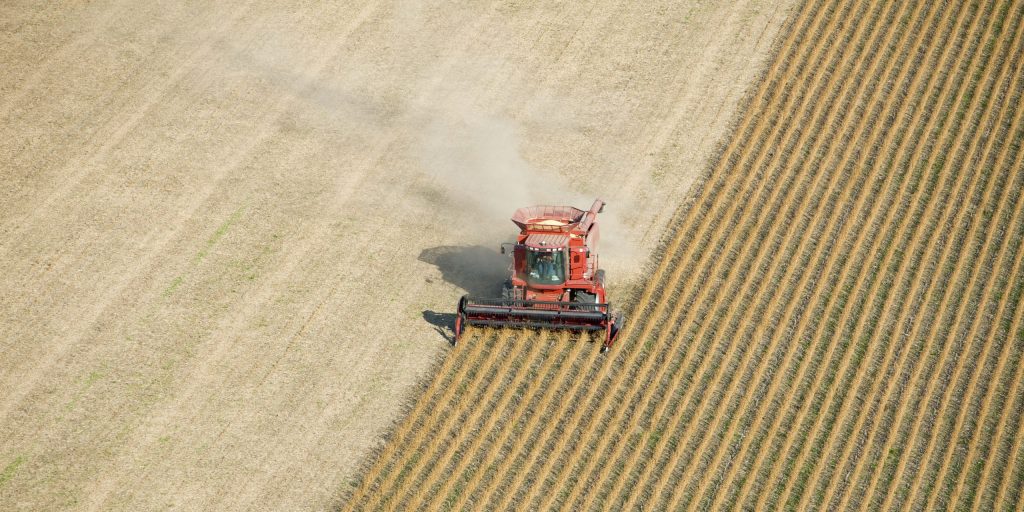South America is paying the price for Europe’s hungry factory farms – with vast monocultures of pesticide-soaked, GM soy where forests used to be. But a new EU proposal aims to boost the amount of soy grown in Europe to ease the pressure on countries in the Global South. At the same time, it must be careful to avoid repeating the problem in Europe, argues Stanka Becheva.
The EU’s Common Agricultural Policy (CAP) has for years rewarded a food and farming system dependent on cheap raw materials overseas and highly intensive production – and in doing so has led to the rise of industrial factory farms. Animals reared in these conditions need extra high-protein feed, but the existing CAP provides no incentive for farmers to grown their own feed.
Instead, feed is imported from overseas in enormous quantities – 23.4 million tons of soybeans are imported into the EU, but less than 2 million tons are produced domestically. This means an estimated 16 million hectares of land are required outside the EU to feed its livestock sector. This is equivalent to 90% of Germany’s entire agricultural area. The impacts are mainly focused in South America, where Brazil, Argentina and Paraguay together supply 73% of the EU’s soy.
These statistics hide a harsh reality on the ground. Soy is produced in enormous, barren monocultures, with forests and biodiversity being cleared on a massive scale to make way for plantations. Soils are rapidly exhausted, as the strains of GM soy require huge amounts of pesticides – leading to water pollution and health problems for local communities. Small farmers are forcibly removed or even killed to make space for the soy plantations.
Political action to address these impacts has been shockingly absent. A glimmer of hope however is on the horizon, with European agricultural ministers from 13 EU countries expected to put pen to paper on a German-Hungarian proposal to boost European soy – the European Soya Declaration – next week.
The declaration calls on European governments to address Europe’s huge dependency on imported soy, and goes further, suggesting measures to tackle meat overconsumption. Respectively, it encourages governments to increase the production and use of sustainably produced and locally adapted legumes for animal feed, and encourages citizens to move to more plant-based-protein diets.
On one hand, the declaration’s recognition of what has gone so devastatingly wrong in South America should be applauded, and shows the kind of progressive thinking that needs to underpin broader change in EU agricultural policy.
However, it leaves itself open to pitfalls – and risks opening up parts of Europe to similar problems to those that have plagued South America.
Firstly, it sees the greatest potential to increase soya production in central and Eastern Europe – home to the majority of the EU’s remaining small-scale peasant farmers, whose existence is already precarious. It models the expansion without a socio-economic impact assessment, potentially putting small-scale farmers at risk of being driven out by large, agribusiness-fuelled soy monocultures.
In addition, it lacks much-needed steps to go further, and tackle the other destructive impacts of factory farming. Factory-farmed animals in Europe suffer in particularly poor conditions, produce huge amounts of effluent leading to water and soil pollution, are a significant contributor to climate change, and are pumped full of antibiotics, causing rising antibiotic resistance.
If this declaration is meant to truly indicate real political will to reduce the production of unsustainable soy, it must go hand in hand with reducing the number of factory-farmed livestock. This would mean both giving up on the idea of ever-increasing exports as part of EU trade strategies and reducing personal consumption levels of dairy and meat within the EU.
Friends of the Earth Europe hopes that the European Soy Declaration will make national and EU politicians support genuinely sustainable protein crop production in Europe, as well as more meat-free diets. Soy and other leguminous crops should be not grown in monocultures. Appropriate varieties should be essential part of well-planned crop rotations, avoiding any use of artificial pesticides. This is the only acceptable way to increase protein plant production in Europe.
Friends of the Earth Europe also calls on EU governments to rethink the role of industrial livestock production and take urgent steps to tackle production and consumption levels. This would lead to reducing the need of importing soy from the South.
The upcoming reform of the Common Agricultural Policy is an excellent opportunity to set new goals for a different food and farming system in Europe, supporting agro-ecological methods of production, re-localising food distribution and bringing food and farming much closer to the people who eat.







